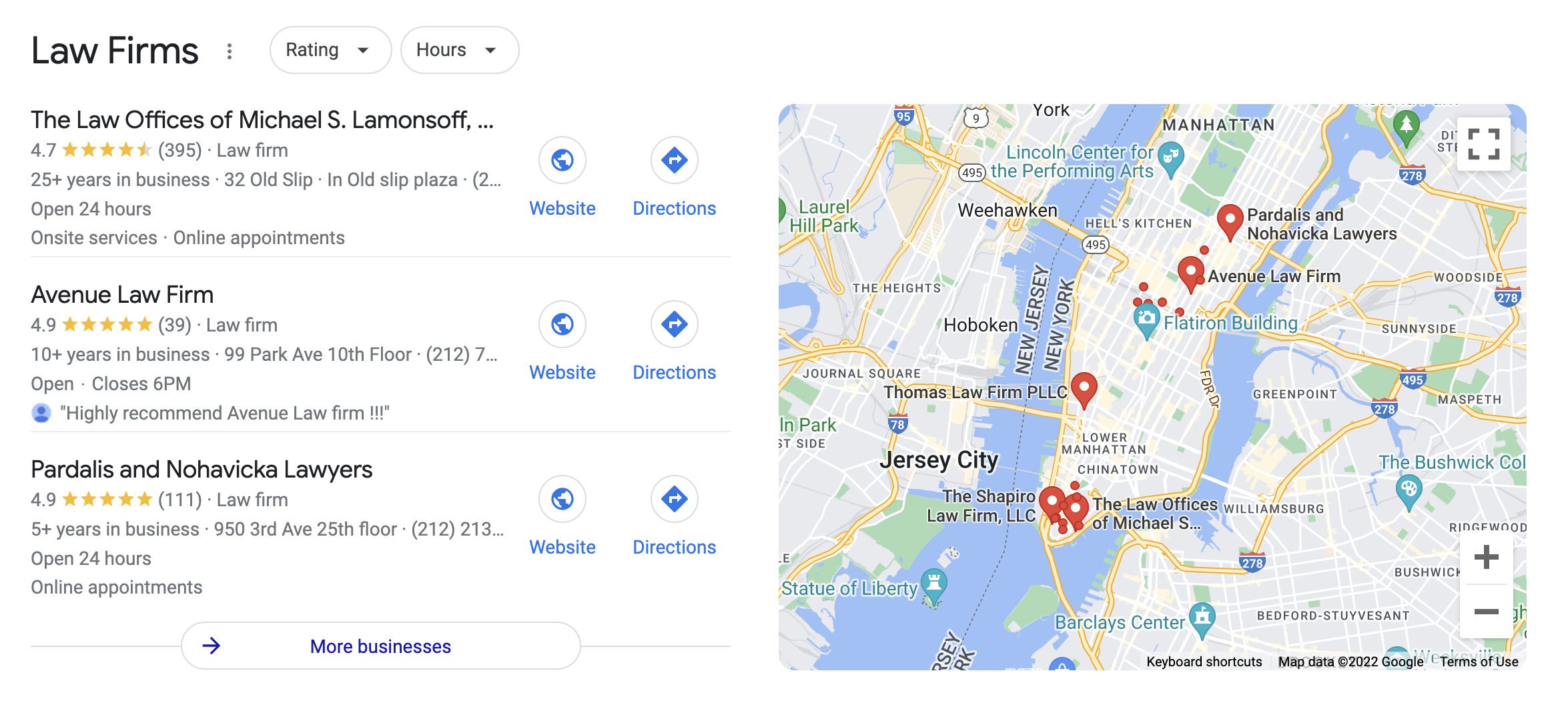7 SEO Best Practices for Law Firms and Attorneys
[ad_1]
Law firms and practicing attorneys around the country are in a constant battle to rank at the top of the search results in order to acquire new customers, while also growing their business and brand. With more competition moving into this space daily, it’s now more important than ever to not only understand how SEO plays a role in this process, but also making sure it’s being used correctly to see the best results possible.
Through the use of recommended SEO best practices for law firms, no matter how big or small an agency or practice might be, there is still a ton of room for improvement and growth. And this doesn’t apply to just search engine traffic, but also social media, Google Business listings, brand reputation and much more!
In this article, we’ll talk about how to find your firm’s keywords, incorporate them into your website, and create useful legal content. We’ll also talk about adding Metadata and Title Tags to your website, and how running a WordPress blog can speed up and further optimize the process.
And remember – no matter how many of the recommended tips and optimizations you implement from the list below, your website must be easy to navigate. It should be easy to find your law firm’s contact information.

1 – Spend Time to Focus on Your Firm’s Keywords
To make the most out of your SEO campaign, you need to know what your target audience is looking for. This way, you can create targeted content that focuses on these keywords. Identify which keywords are most commonly searched in your industry, and use these words to rank well on Google. Keywords should be strategically placed throughout your website to maximize their relevance and popularity. You can use tools like Ahrefs to find out what your competitors are using to rank well in Google.
One of the most important aspects of SEO for a law firm is finding relevant keywords. Keyword research is crucial for finding relevant keywords, but this should be done with the right tools. You can use paid and organic SEO tools, such as SEMRush, to do keyword research. Try typing your keywords into a search engine, and the tool will provide you with suggestions with related keywords. Once you have a list of keyword phrases, you can test them to see which ones get the most traffic.

2 – Incorporate Keywords Into Your Website
Incorporate keywords into your website for law firms to increase traffic and rank high in search engines. To achieve this goal, your website should be optimized for search engines by incorporating genuine, top-quality content. The best way to do this is to have a knowledgeable marketing team. A marketing team that understands the ins and outs of SEO can help bring prospective clients to your website. They will analyze your website and determine the most popular keywords, as well as optimize your website structure to increase ranking.
And when it comes to finding the right keywords, it’s simply a matter of knowing what services you offer, while also blending in what questions and topics people are searching for. After some quick researching online, we came across an extremely useful law firm keyword list from WordStream, which can be seen below. And not only does it include the keywords, it also has the estimated monthly search volume as well.

Keywords that have research intent make sense for your website content. These terms usually begin with “why” or “how.” This content makes sense for case studies, white papers, and blog posts. Videos are a great way to use keywords to educate prospects. Research-intent content also tends to generate more links, which are important ranking factors. For example, if your website is about criminal law, use keywords that start with “criminal defense.”
3 – Create Useful Legal Content for Your Audience
For a successful SEO campaign, law firms should produce high-quality legal content. This content should address the needs and questions of your target clients. This is particularly true of blog posts, service pages, and location pages. Providing comprehensive information for your target audience can lead to higher conversion rates. Moreover, the content must be readable to appeal to your target audience. Listed below are some tips to help law firms create relevant and useful legal content.
And if you are at a complete loss as to what you should be writing about, just take a look at some of the most commonly asked questions of clients when visiting with an attorney or law firm for the first time. (source)
- How Long Have You Practiced Law?
- What Types of Cases Do You Manage?
- Who’s Your Typical Client?
- How Many Similar Cases Have You Taken On?
- What Kind of Special Training or Knowledge You Have Outside Your Law Degree?
- What Are Your Fees and Costs?
- How Would You Represent Me?
- What Alternatives Do I Have?
- How Will You Let Me Know What’s Going on With My Case?
- Finally, Will I Win or Lose?
By having this type of information provided to clients as content on your site, not only are you providing value, it’s also eliminating the need for your firm to answer the same questions over and over gain.
Long-form content should be created with your clients in mind. This could be articles about the litigation process, case studies, or definitions of complex legal terms. While creating this type of content, avoid sales-oriented language and avoid pushy sales techniques. Instead, create long-form content to foster a relationship with your clients and build trust.
4 – Optimize Title Tags, Metadata and Content
One of the most important aspects of SEO for law firms is including title tags and metadata. Both of these are hidden links on your website that appear in search results. When writing your meta title, make sure to use your keywords and avoid using overly lengthy descriptions. Your meta title should not exceed 60 characters. This way, search engines will read your title and provide you with a better chance of attracting new leads.
Your title tag should be unique to your website. It should accurately describe the content on your page. Inaccurate or misleading title tags will result in a website being demoted from the search engine, and this could be extremely off-putting for potential clients. If the idea of title tag and metadata seems a bit complicating and time consuming, we recommend using a CMS like WordPress, which has plenty of plugins like Yoast — which can help with tags and metadata.
Also, you can use a law firm SEO guide for further help. This will help you optimize your website for maximum visibility and SEO success.
5 – Provide a Great User Experience
When doing SEO for law firms, you should focus on providing a good user experience. Whether you want to increase your ranking on Google or boost your lead generation, you must first determine your target audience. This can be done by creating buyer personas. These can help you tailor content to your target audience. Having an informative site is key for both conversion and ranking. If you do not provide a good user experience, your visitors will move on to another website.
SEO for law firms can increase the online reputation of your law firm and increase external website traffic. Google considers user experience when ranking websites, including page speed and title tags. To create a better user experience for your site visitors, make sure you have a clear and concise website structure. By providing relevant answers to your visitors’ questions, you’ll be more likely to engage them and generate leads.
Another last recommended tip for user experience, is to add a chat box and easy contact forms on your site. It’s one thing to have a great site, but you also want to make sure it’s engaging with your audience and there for them 24/7.
6 – Include Trusted Links in Site Content
Incorporating links into your site content is an integral part of SEO for law firms. Internal links lead users to the information they are looking for quickly. External links should lead to content that is relevant and not spammy. Use reputable website designers that understand SEO best practices and design fast, efficient sites. Also, don’t forget about branding – include high-quality photography, a professional logo, and messaging throughout your site.
Guest blogging is another effective way to build links. Publish a piece of content on another website, often an industry blog or a completely independent site, and then resource the article with backlinks to your website. While guest posting has a number of drawbacks, it can be highly effective when used properly. The most important things to remember when guest posting are to publish on reputable sites, include links naturally within the content, and avoid using over-optimized anchor text.
Increasing the number of unique referring domains can increase rankings and traffic for your site. Ensure that you include a sitemap for search engines, which allows them to crawl individual pages. While duplicate content can hurt your rankings, removing it will improve the odds of your website being ranked high in search results. This is a valuable strategy for any law firm. It will help your site rank higher in search engines by ensuring that visitors can easily find the information they need.
7 – Complete Your Google Business Profile Page
Your GMB listing can be optimized in several ways. First, you should add your phone number and website URL. If you have more than one location, you will need to add all of those locations as well. If your firm doesn’t have a website yet, you can set one up for free using your GMB listing. Otherwise, you can always add a URL for a free Google website. Having all of this information in one place will help you rank highly for keywords related to your firm.

Another way to make your page more effective is to focus on the categories. For example, if your firm specializes in personal injury law, choose your primary practice area, but don’t forget about your supporting practice areas, such as employment law, family law, and real estate. Be sure to also include the cities and suburbs surrounding your primary location. If you handle cases throughout the state, include the state, too.
Law Firm SEO Summary
Among the most important aspects of a successful law firm website is its ability to attract new clients. In addition to the law firm website, you should include keywords in all blog posts, thereby attracting potential clients. While keywords may not impact rankings directly, a compelling meta description tag will entice a potential client to click on your site and potentially become a client. To attract new clients, you should also include a phone number in your meta description.
Google’s algorithm has several factors that influence a website’s ranking, including the website’s E.A.T (expertise, authoritativeness, and trustworthiness). A good website should provide good services and accurate information. If a website has bad links or inaccurate content, it could be penalized by Google. If your website has good links, it will be ranked well in search results with continue optimization and promotion. This is because Google’s algorithm changes frequently and focuses on quality sites with more positive reviews.
If you enjoyed the content in this article today, we have plenty of other great resources for you to view as well. Be sure to check out the latest trending topics on the main page of TechBullion, and also this recent video content creation reference guide.

[ad_2]
Source link







